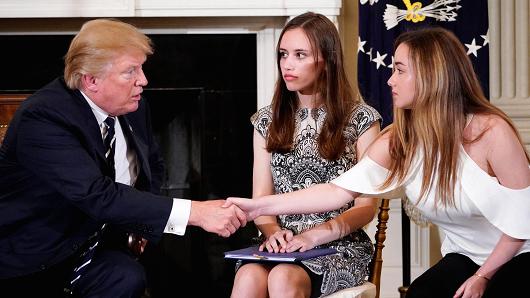
Mandel Ngan | AFP | Getty Images
President Donald Trump shakes hands with Marjory Stoneman Douglas High School student Ariana Klein (R) watched by fellow student Carson Abt at the start of a listening session on gun violence with teachers and students in the State Dining Room of the White House on February 21, 2018.
Some of the students and their parents have argued for a ban on assault-style rifles and for universal background checks, among other measures to reduce gun violence. Other students or parents affected by the shooting have opposed new gun restrictions and instead called for better mental health care or more armed officials in schools. (The Broward County, Florida, sheriff currently faces backlash because an armed deputy apparently stayed outside the school during the shooting.)
At the same time, public opinion polls have also changed the dynamic for lawmakers and candidates. Multiple surveys released since the Florida shootings, including one by Quinnipiac University, have found that about two-thirds of voters support tighter gun laws.
A larger percentage of voters than ever backed tougher gun restrictions in Quinnipiac’s national polling this month — only 47 percent did in December 2015. The poll also found 97 percent support for universal background checks, and 67 percent back a ban on assault-style rifles.
“Given that we’ve seen a 20-point swing toward stricter gun control in the last two years, you can only imagine that there’s a sea change happening and it may turn into a tidal wave,” said Tim Malloy, assistant director of the Quinnipiac University poll.
On Wednesday, Trump added more fuel to the debate in a freewheeling, televised discussion with bipartisan lawmakers. He openly told Republicans they are “afraid” of the NRA and appeared to be open to a universal background check bill. He also raised eyebrows by suggesting police should “take” guns from potentially dangerous people, then “go through due process second.”
His remarks about due process were met with strong, immediate resistance from conservatives.
“Strong leaders don’t automatically agree with the last thing that was said to them. We have the Second Amendment and due process of law for a reason,” Sen. Ben Sasse, R-Neb., said in a statement. “We’re not ditching any Constitutional protections simply because the last person the President talked to today doesn’t like them.”
 EU News Digest Latest News & Updates
EU News Digest Latest News & Updates



